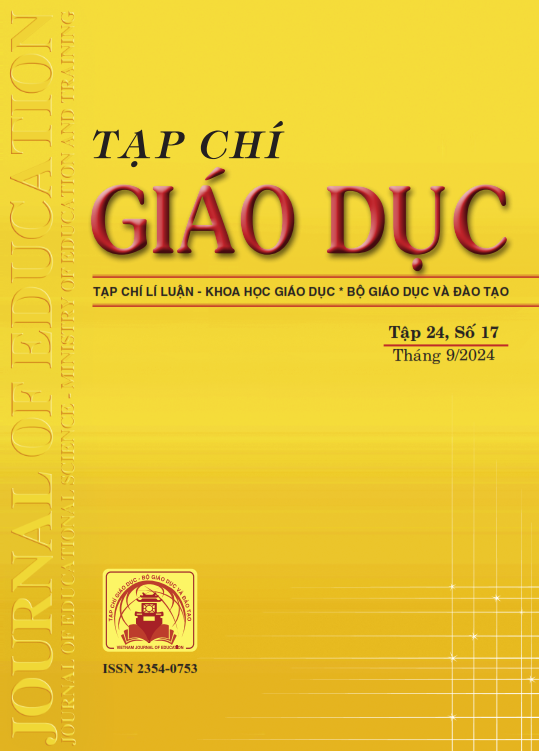Sự buông xả (non-attachment) của người trưởng thành trẻ tuổi: Một nghiên cứu tại Thành phố Hồ Chí Minh
- Từ khóa:
- Non-attachment
- Buddhism
- young adults
- mental health
Tóm tắt
Non-attachment is a research topic with origins in Buddhism. It emerged in the third wave of therapy and quickly gained the attention of many psychologists due to research findings indicating that non-attachment is a factor that influences or predicts positive/negative emotions, mental health, and, most importantly, people's perception of happiness. In Vietnam, this research direction has not received much attention from researchers. Therefore, this study was conducted to better understand non-attachment among young adults in Vietnam. The results showed that non-attachment was at a high level and there were differences in non-attachment among the surveyed young adults in terms of gender, age, education level, personal income level and relationship status.
Tài liệu tham khảo
Elphinstone, B., Whitehead, R., & Bates, G. (2020). ‘Letting go’and flourishing in study: An investigation of the indirect relationship between nonattachment and grades via psychological wellbeing. Learning and Individual Differences, 78, 101847. https://doi.org/10.1016/j.lindif.2020.101847
Grossmann, K. E., Grossmann, K., & Waters, E. (Eds.). (2006). Attachment from infancy to adulthood: The major longitudinal studies. Guilford Press.
Gupta, K., & Agrawal, J. (2020). Lay meanings and associated experiences of nonattachment (anasakti): A study from India. Journal of Humanistic Psychology, 0022167820977563. https://doi.org/10.1177/0022167820977563
Huxley, A. (1937). Ends and means: An inquiry into the nature of ideals and into the methods employed for their realization. Transaction Publishers.
Nguyễn Lân (2000). Từ điển Từ và Ngữ Việt Nam. NXB Tổng hợp Thành phố Hồ Chí Minh.
Nguyễn Thị Minh Hằng, Bùi Thị Quỳnh Anh (2017). Thích ứng thang đo Buông xả trên tín đồ Phật giáo. Tạp chí Tâm lí học, 10(223), 36-46.
Nguyễn Thị Minh Hằng, Đặng Hoàng Ngân (2019). Ảnh hưởng của niềm tin Phật giáo đến sức khỏe tâm lí của con người. NXB Đại học Quốc gia Hà Nội.
Nguyễn Trâm Anh (2016). Ảnh hưởng của buông xả đến cảm nhận hạnh phúc tâm lí của tín đồ Phật giáo. Luận văn tốt nghiệp, Trường Đại học Khoa học xã hội và Nhân văn - Đại học Quốc gia Hà Nội.
Sahdra, B. K., Shaver, P. R., & Brown, K. W. (2010). A scale to measure nonattachment: A Buddhist complement to Western research on attachment and adaptive functioning. Journal of Personality Assessment, 92(2), 116-127.
Wang, S. Y., Wong, Y. J., & Yeh, K. H. (2016). Relationship harmony, dialectical coping, and nonattachment: Chinese indigenous well-being and mental health. The Counseling Psychologist, 44(1), 78-108.
Wallace, B. A., & Shapiro, S. L. (2006). Mental balance and well-being: building bridges between Buddhism and Western psychology. American Psychologist, 61(7), 690-701. https://doi.org/10.1037/0003-066X.61.7.690
Whitehead, R., Bates, G., Elphinstone, B., Yang, Y., & Murray, G. (2019). Nonattachment mediates the relationship between mindfulness and psychological well-being, subjective well-being, and depression, anxiety and stress. Journal of Happiness Studies, 20, 2141-2158.
Whitehead, R., Bates, G., Elphinstone, B., & Yang, Y. (2021). The relative benefits of nonattachment to self and self‐compassion for psychological distress and psychological well‐being for those with and without symptoms of depression. Psychology and Psychotherapy: Theory, Research and Practice, 94(3), 573-586.
Tải xuống
Đã Xuất bản
Cách trích dẫn
Số
Chuyên mục
Giấy phép

Tác phẩm này được cấp phép theo Ghi nhận tác giả của Creative Commons Giấy phép quốc tế 4.0 .












